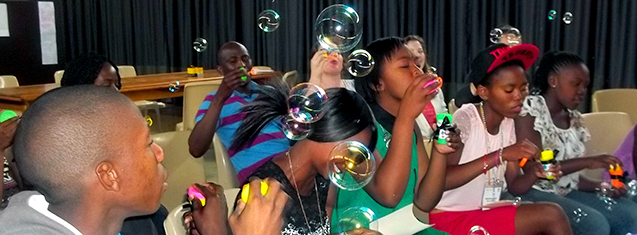Latest News Archive
Please select Category, Year, and then Month to display items
12 October 2020
|
Story Arina Engelbrecht
|
Photo Supplied
 Arina Engelbrecht from Organisational Development and Employee Well-being believes physical activity has a number of benefits for one’s health, including stress relief.
Arina Engelbrecht from Organisational Development and Employee Well-being believes physical activity has a number of benefits for one’s health, including stress relief.
Being physically active plays a big role in preventing the development of mental-health problems and in improving the quality of life of people experiencing mental-health problems.
Treatment for depression
Physical activity can be an alternative treatment for depression. It can be used as a stand-alone treatment or in combination with medication and/or psychological therapy. It promotes all kinds of changes in the brain, including neural growth, reduced inflammation, and new activity patterns are formed that promote feelings of calm and well-being. It releases endorphins – powerful chemicals in the brain that energise your spirit and make you feel good.
Physical activity can be very effective in relieving stress. Research in adults has found that physically active individuals tend to have lower stress levels compared to individuals who are less active. It also leads to improved sleep. When a person sleeps better and feels more rested, overall quality of life improves. They cope better with daily life stressors.
Reduce Alzheimer's risk
Regular physical activity can reduce your risk of developing Alzheimer's disease by up to 50%. It can also slow down further deterioration in those who have already started to develop cognitive problems. It stimulates the brain’s ability to maintain old connections as well as to make new ones.
A study asked people to rate their mood immediately after periods of physical activity (e.g. going for a walk/run, cycling, doing housework) and periods of inactivity (e.g. reading a book or watching television). Researchers found that participants felt more content, more awake, and calmer after being physically active compared to after periods of inactivity.
In conclusion, people who are physically active feel a sense of well-being, feel more energetic throughout the day, sleep better at night, have sharper memories, and feel more relaxed and positive about themselves and their lives.
“Being physically active not only changes your body, it changes your mind,
attitude, and your mood.” – Arina Engelbrecht
Digital Storytelling empowers and liberates students
2014-10-17

In January 2014, Jode Brexa, an American Fulbright scholar, came to our university and moved into the guest room at Welwitschia residence.
It so happened that Brexa and Elize Rall, residence head of Welwitschia – better known as Wel-Wel – started talking about digital storytelling. Brexa’s Digital Storytelling project captured Rall’s imagination. Shortly thereafter, Brexa convinced the RC members of Wel-Wel to participate in the project.
Digital storytelling is, on the most basic level, the use of computer-based resources to tell stories. The idea is to combine the art of storytelling with multimedia – including graphics, photos, text, audio, image and/or music.
The Wel-Wel students were taught storytelling skills and each student’s unique story was recorded and edited. It was so successful that they then showed their stories to the Rector and Dean of Students. Brexa will now – with their permission – take their stories to America with her, where she will share it with her community.
During the weekend of 10–12 October 2014, the RC of Wel-Wel introduced 12 learners, who are currently in Grade 10 at the Christiaan Liphoko School, to the project. The learners stayed in the gazellie for the weekend and, in the course of a few days, learned how much power is locked up in their personal stories. They learned that everyone’s story has the power to inspire and empower.
Wel-Wel has been involved in various outreach projects to the community. However, this was the first time that Wel-Wel literally brought the community to their doorstep. This is also not a charitable project. It is uplifted students reaching out to the youth to empower them in order to empower others in turn.
Meanwhile, Brexa also linked the project to the university’s Schools Partnership Project. The programme works through mentorship programmes to uplift previously disadvantaged schools. Hands were also taken with Columba Leadership NGO – financed by Old Mutual.